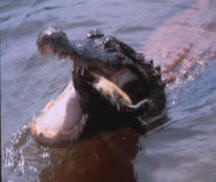Alligators are carnivorous reptiles. Adults will predominantly eat fish, turtles, snakes, water birds, mammals, amphibians, and also anything else that lives or comes near the water! They are opportunistic feeders. This means that they will eat pretty much anything that comes near them just because they know they will not have to waste any energy going to look for something to eat later. They have been known to have sticks, stones, fishing lures, and aluminum cans in their stomachs. The stones play a vital part in the alligators nutritional diet. They swallow their food whole so they need these stones to break apart their food. Young gators, or juveniles, predominantly feed on insects, snails, invertebrates (worms especially), frogs, small fish, and spiders. When they start to grow up they move to small mammals like raccoons.
Adult alligators are the top of the food chain because they have even been known to take down bears and Florida panthers! This puts them at the top hands down (that is other than humans)!
Alligators are nocturnal, which just means they primarily feed at night.
The alligators depend on the wetlands but the wetlands depend on them just as much. Being at the top of the food chain, they control the population of other animals. This helps to keep any one organism from becoming too abundant and overtaxing the land.

